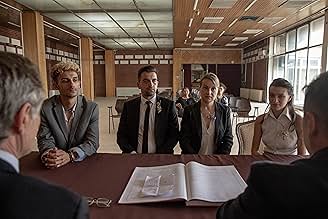IMDb-BEWERTUNG
6,9/10
1047
IHRE BEWERTUNG
Eine queere Frau ist gezwungen, die Tochter ihrer Partnerin aufzuziehen, die selbst keine Mutter sein will.Eine queere Frau ist gezwungen, die Tochter ihrer Partnerin aufzuziehen, die selbst keine Mutter sein will.Eine queere Frau ist gezwungen, die Tochter ihrer Partnerin aufzuziehen, die selbst keine Mutter sein will.
- Auszeichnungen
- 10 Gewinne & 8 Nominierungen
Mia Mustafi
- Vanesa
- (as Mia Mustafa)
Dzada Selim
- Mia
- (as Džada Selim)
Alina Serban
- Suada
- (as Alina Șerban)
Ajse Useini
- Teuta
- (as Ajshe Useini)
Rozafa Celaj
- Flora
- (as Rozafë Çelaj)
Aleksandra Pesevska
- Receptionist
- (as Aleksandra Peshevska)
Handlung
WUSSTEST DU SCHON:
- WissenswertesOfficial submission of North Macedonia for the 'Best International Feature Film' category of the 96th Academy Awards in 2024.
- SoundtracksCeresna Se Od Koren, Kornese
Macedonian Traditional Song
Ausgewählte Rezension
Following the intensity and romantic themes of his earlier works, Goran Stolevski, the talented Macedonian-Australian director, presents a different facet in this vibrant and chaotic domestic drama. This film has been chosen as Macedonia's submission for the international Oscar shortly after its debut in the Horizons section of the Venice Film Festival, and the rationale is evident. The Romale lifestyle is perpetually engaging, both on and off the screen, and is inherently dramatic-ideal for cinematic storytelling. Naturally, to secure European Commission funding, a narrative with LGBTQ+ themes is often necessary, resulting in a film that is inclusive and reflective of contemporary society. But, I personally do not think there is any chance you could have so many gay people at one place in a city like Skopje - only way is if they were part of some "gay sect" as Mia Mustafi
as Vanesa insinuated to the police in one of the scenes.
Having spent several years in Skopje, I found the portrayal somewhat surreal-only the Roma characters resonated as authentic. The other characters were intended to represent a modern family dynamic: Dita (Anamaria Marinca), an Albanian lesbian from Kosovo; Dita's Roma partner Suada (Alina Serban); the brooding teenager Vanesa (Mia Mustafa) and the exuberant kindergartener Mia (Dzada Selim), who are Suada's daughters from previous relationships; along with Dita's long-time gay friend Toni (Vladimir Tintor). Stolevski immerses the audience in this unconventional scenario with minimal exposition, trusting viewers to discern the relationships and backstories through the dialogue and physical interactions. The film's opening, which introduces the characters through their interactions, was particularly effective; however, the narrative lost its focus in the final act, feeling hurried and lacking depth.
While I will refrain from divulging too much of the plot, I must express my discontent with co-productions that prioritize foreign actors for lead roles. In this instance, Romanian-born Anamaria Marinca struggled to embody her character, appearing detached even during the most poignant scenes. In contrast, Serbian actor Vladimir Tintor delivered a stronger performance, yet I believe there were numerous Macedonian actors who could have matched or surpassed his portrayal.
The film features commendable cinematography and competent direction, though it suffers from inconsistencies, the screenplay was warm and dramatic, camera work challenging and sometimes adventurous... things were mostly good!
Having spent several years in Skopje, I found the portrayal somewhat surreal-only the Roma characters resonated as authentic. The other characters were intended to represent a modern family dynamic: Dita (Anamaria Marinca), an Albanian lesbian from Kosovo; Dita's Roma partner Suada (Alina Serban); the brooding teenager Vanesa (Mia Mustafa) and the exuberant kindergartener Mia (Dzada Selim), who are Suada's daughters from previous relationships; along with Dita's long-time gay friend Toni (Vladimir Tintor). Stolevski immerses the audience in this unconventional scenario with minimal exposition, trusting viewers to discern the relationships and backstories through the dialogue and physical interactions. The film's opening, which introduces the characters through their interactions, was particularly effective; however, the narrative lost its focus in the final act, feeling hurried and lacking depth.
While I will refrain from divulging too much of the plot, I must express my discontent with co-productions that prioritize foreign actors for lead roles. In this instance, Romanian-born Anamaria Marinca struggled to embody her character, appearing detached even during the most poignant scenes. In contrast, Serbian actor Vladimir Tintor delivered a stronger performance, yet I believe there were numerous Macedonian actors who could have matched or surpassed his portrayal.
The film features commendable cinematography and competent direction, though it suffers from inconsistencies, the screenplay was warm and dramatic, camera work challenging and sometimes adventurous... things were mostly good!
Top-Auswahl
Melde dich zum Bewerten an und greife auf die Watchlist für personalisierte Empfehlungen zu.
- How long is Housekeeping for Beginners?Powered by Alexa
Details
- Erscheinungsdatum
- Herkunftsländer
- Sprachen
- Auch bekannt als
- Housekeeping for Beginners
- Drehorte
- Produktionsfirmen
- Weitere beteiligte Unternehmen bei IMDbPro anzeigen
Box Office
- Bruttoertrag in den USA und Kanada
- 271.065 $
- Eröffnungswochenende in den USA und in Kanada
- 47.225 $
- 7. Apr. 2024
- Weltweiter Bruttoertrag
- 320.607 $
- Laufzeit1 Stunde 47 Minuten
- Farbe
- Sound-Mix
Zu dieser Seite beitragen
Bearbeitung vorschlagen oder fehlenden Inhalt hinzufügen

Oberste Lücke
What is the Brazilian Portuguese language plot outline for Domakinstvo za Pocetnici (2023)?
Antwort





























